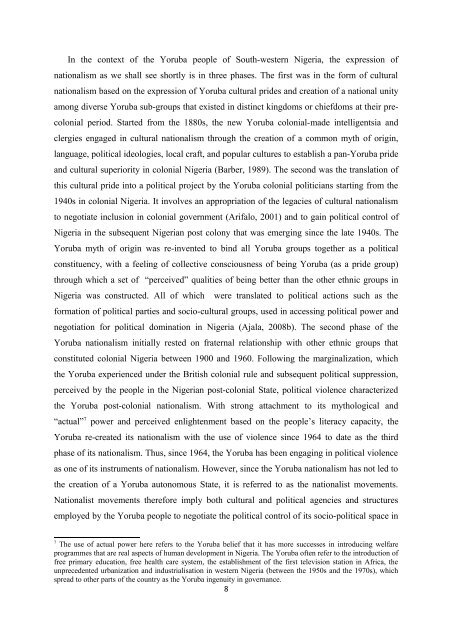The Yoruba Nationalist Movements, Ethnic Politics and Violence: A ...
The Yoruba Nationalist Movements, Ethnic Politics and Violence: A ...
The Yoruba Nationalist Movements, Ethnic Politics and Violence: A ...
Create successful ePaper yourself
Turn your PDF publications into a flip-book with our unique Google optimized e-Paper software.
In the context of the <strong>Yoruba</strong> people of South-western Nigeria, the expression of<br />
nationalism as we shall see shortly is in three phases. <strong>The</strong> first was in the form of cultural<br />
nationalism based on the expression of <strong>Yoruba</strong> cultural prides <strong>and</strong> creation of a national unity<br />
among diverse <strong>Yoruba</strong> sub-groups that existed in distinct kingdoms or chiefdoms at their precolonial<br />
period. Started from the 1880s, the new <strong>Yoruba</strong> colonial-made intelligentsia <strong>and</strong><br />
clergies engaged in cultural nationalism through the creation of a common myth of origin,<br />
language, political ideologies, local craft, <strong>and</strong> popular cultures to establish a pan-<strong>Yoruba</strong> pride<br />
<strong>and</strong> cultural superiority in colonial Nigeria (Barber, 1989). <strong>The</strong> second was the translation of<br />
this cultural pride into a political project by the <strong>Yoruba</strong> colonial politicians starting from the<br />
1940s in colonial Nigeria. It involves an appropriation of the legacies of cultural nationalism<br />
to negotiate inclusion in colonial government (Arifalo, 2001) <strong>and</strong> to gain political control of<br />
Nigeria in the subsequent Nigerian post colony that was emerging since the late 1940s. <strong>The</strong><br />
<strong>Yoruba</strong> myth of origin was re-invented to bind all <strong>Yoruba</strong> groups together as a political<br />
constituency, with a feeling of collective consciousness of being <strong>Yoruba</strong> (as a pride group)<br />
through which a set of “perceived” qualities of being better than the other ethnic groups in<br />
Nigeria was constructed. All of which were translated to political actions such as the<br />
formation of political parties <strong>and</strong> socio-cultural groups, used in accessing political power <strong>and</strong><br />
negotiation for political domination in Nigeria (Ajala, 2008b). <strong>The</strong> second phase of the<br />
<strong>Yoruba</strong> nationalism initially rested on fraternal relationship with other ethnic groups that<br />
constituted colonial Nigeria between 1900 <strong>and</strong> 1960. Following the marginalization, which<br />
the <strong>Yoruba</strong> experienced under the British colonial rule <strong>and</strong> subsequent political suppression,<br />
perceived by the people in the Nigerian post-colonial State, political violence characterized<br />
the <strong>Yoruba</strong> post-colonial nationalism. With strong attachment to its mythological <strong>and</strong><br />
“actual” 7 power <strong>and</strong> perceived enlightenment based on the people’s literacy capacity, the<br />
<strong>Yoruba</strong> re-created its nationalism with the use of violence since 1964 to date as the third<br />
phase of its nationalism. Thus, since 1964, the <strong>Yoruba</strong> has been engaging in political violence<br />
as one of its instruments of nationalism. However, since the <strong>Yoruba</strong> nationalism has not led to<br />
the creation of a <strong>Yoruba</strong> autonomous State, it is referred to as the nationalist movements.<br />
<strong>Nationalist</strong> movements therefore imply both cultural <strong>and</strong> political agencies <strong>and</strong> structures<br />
employed by the <strong>Yoruba</strong> people to negotiate the political control of its socio-political space in<br />
7<br />
<strong>The</strong> use of actual power here refers to the <strong>Yoruba</strong> belief that it has more successes in introducing welfare<br />
programmes that are real aspects of human development in Nigeria. <strong>The</strong> <strong>Yoruba</strong> often refer to the introduction of<br />
free primary education, free health care system, the establishment of the first television station in Africa, the<br />
unprecedented urbanization <strong>and</strong> industrialisation in western Nigeria (between the 1950s <strong>and</strong> the 1970s), which<br />
spread to other parts of the country as the <strong>Yoruba</strong> ingenuity in governance.<br />
8

















